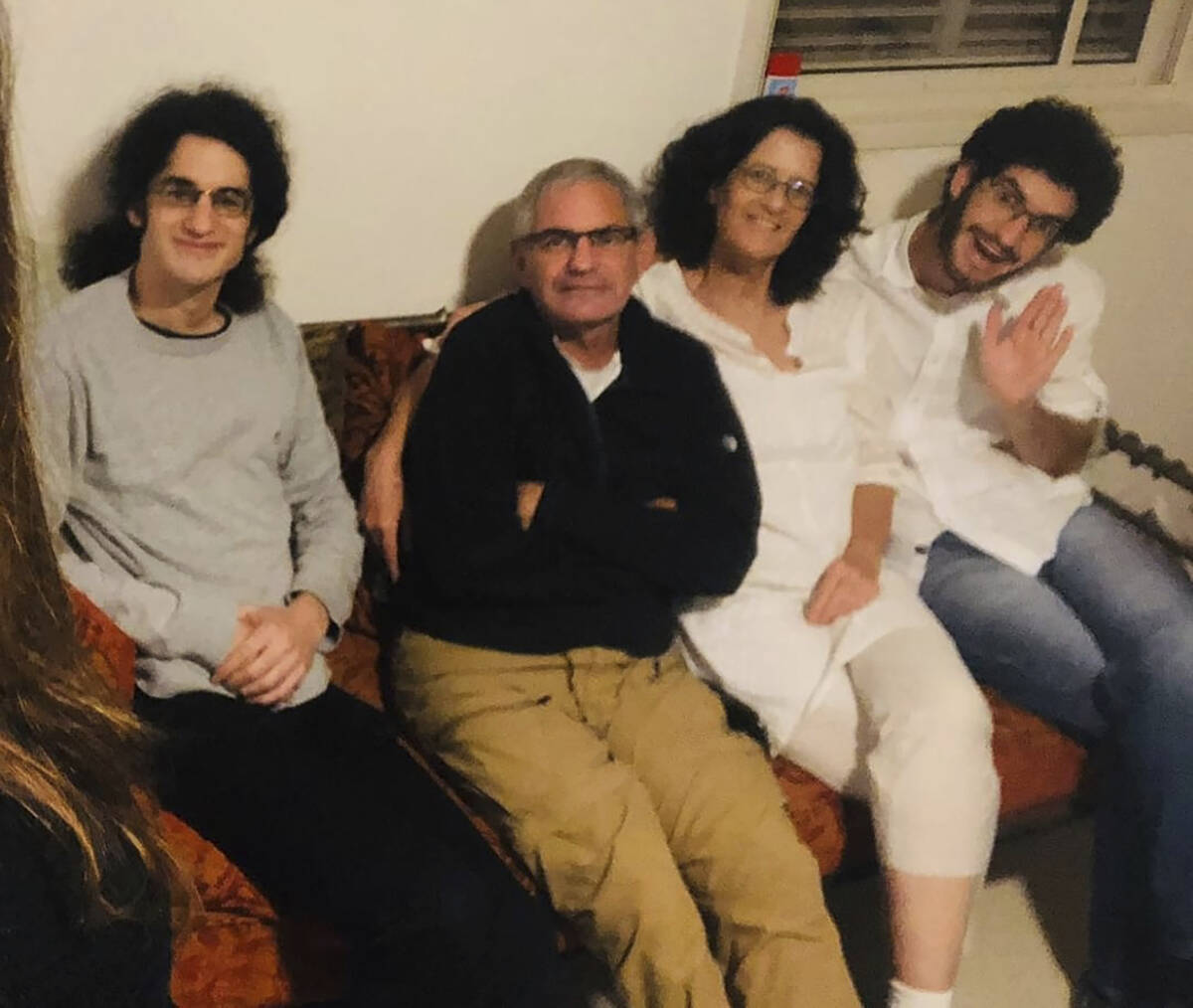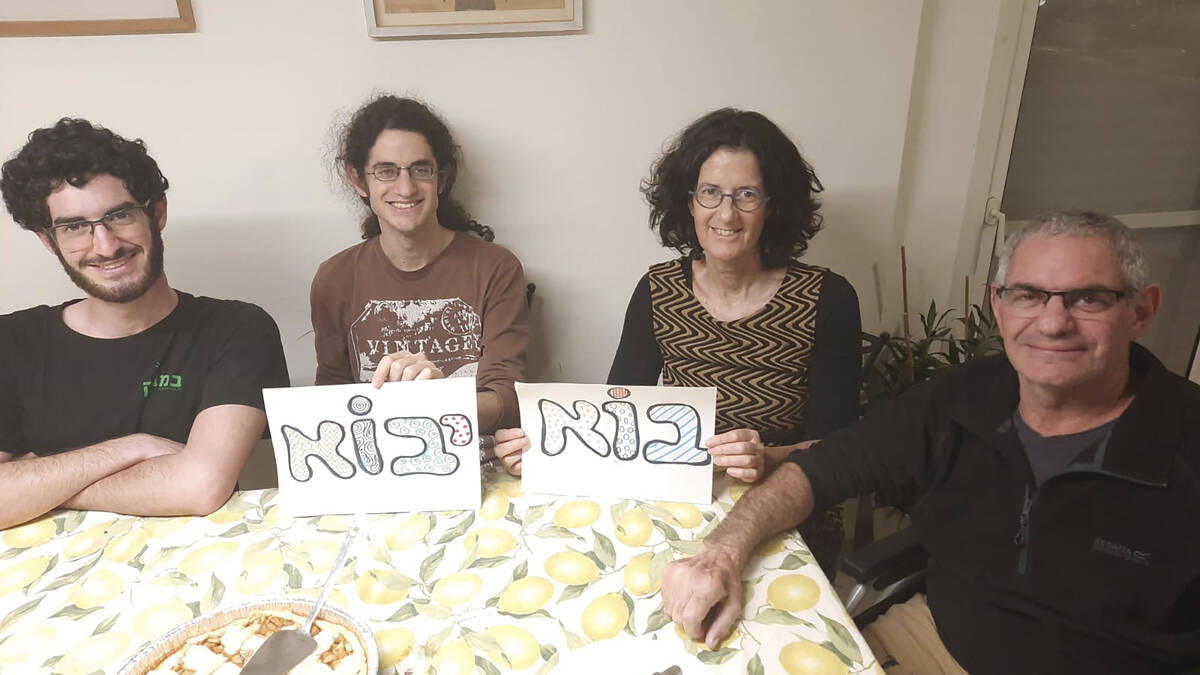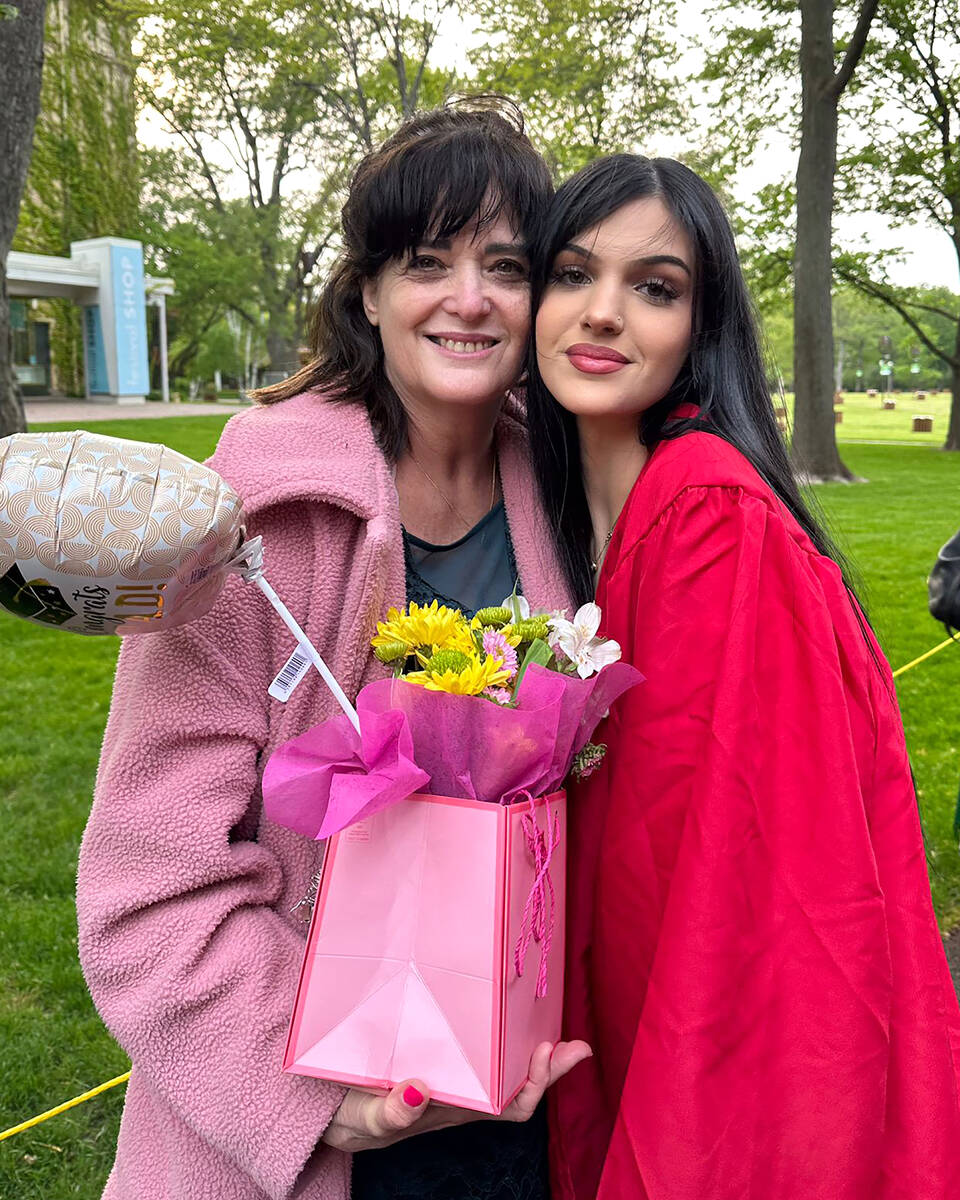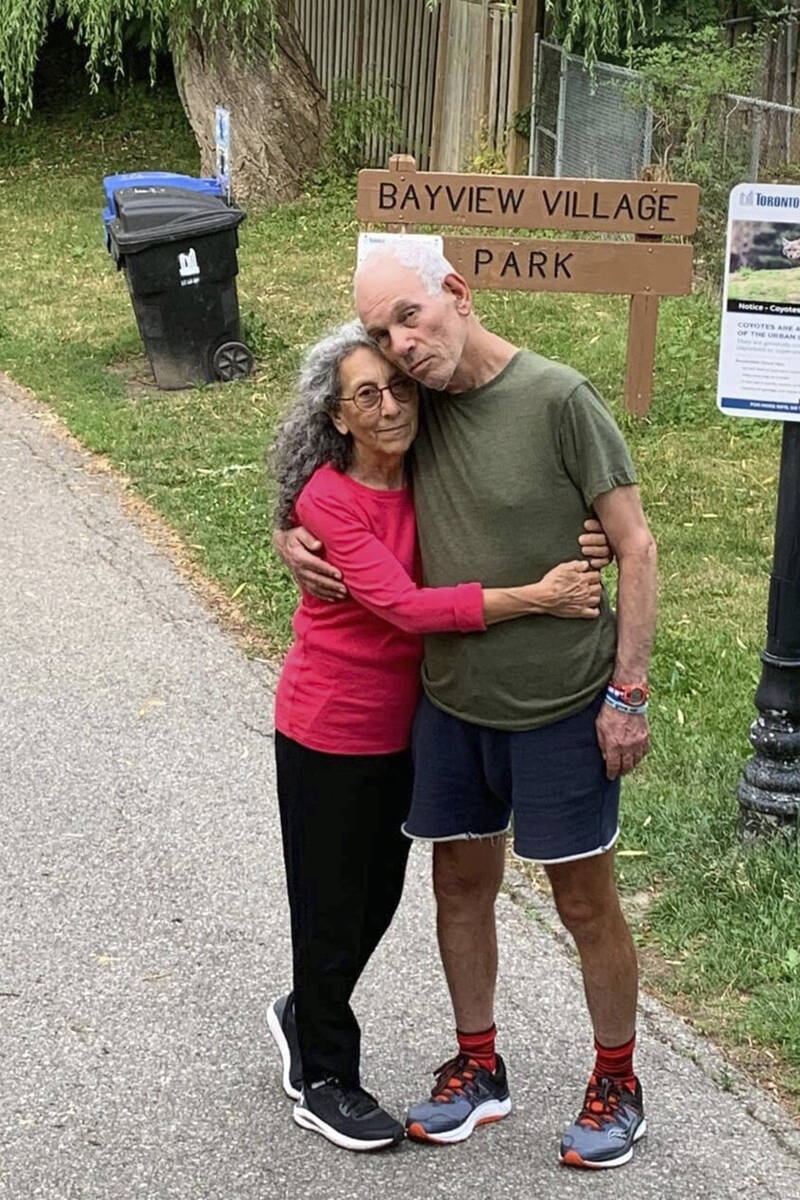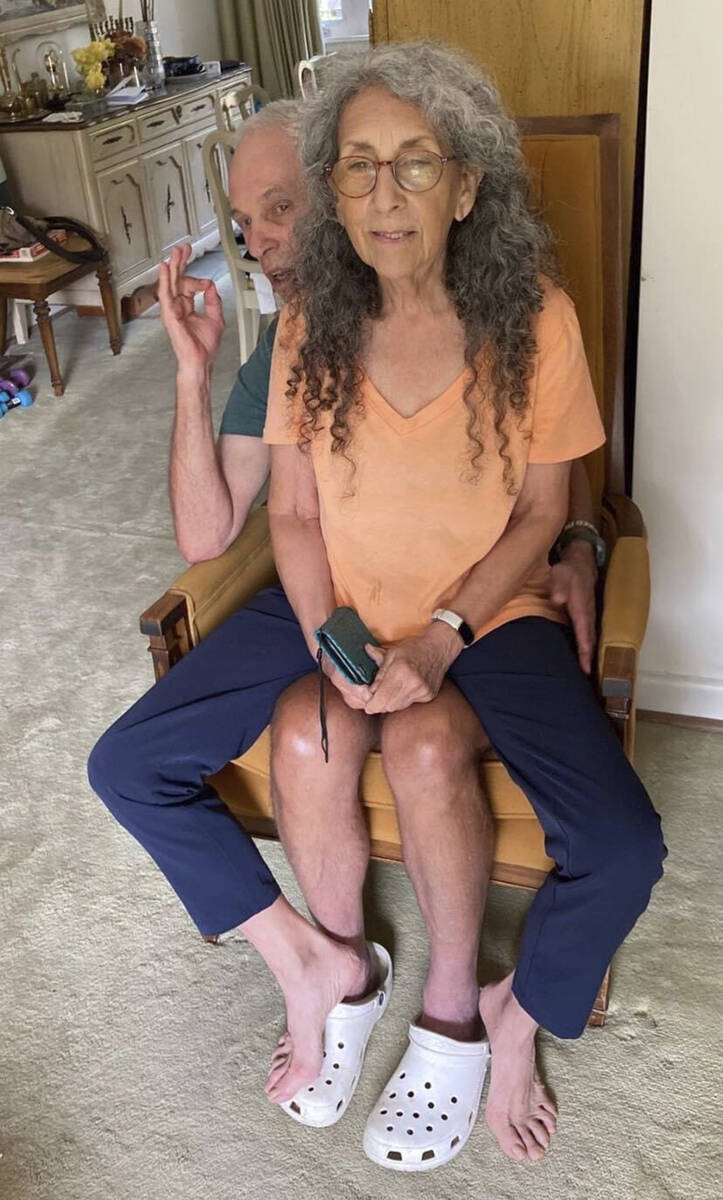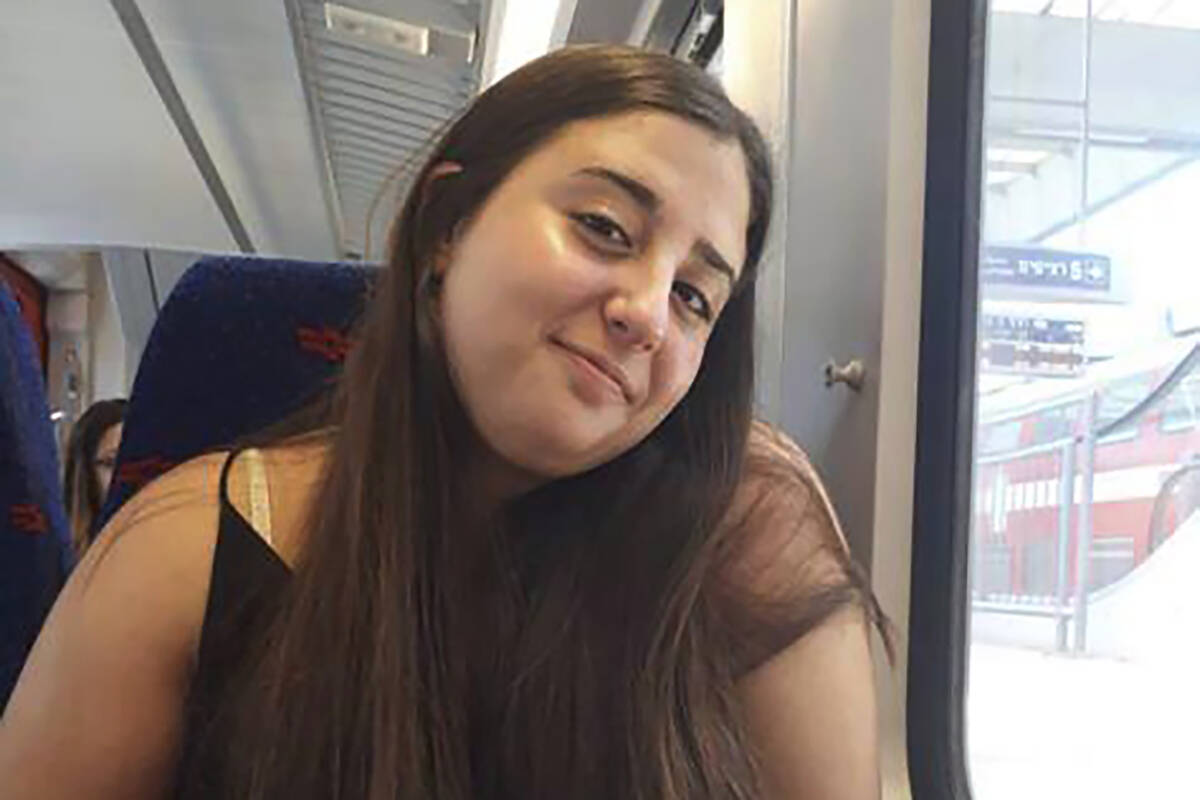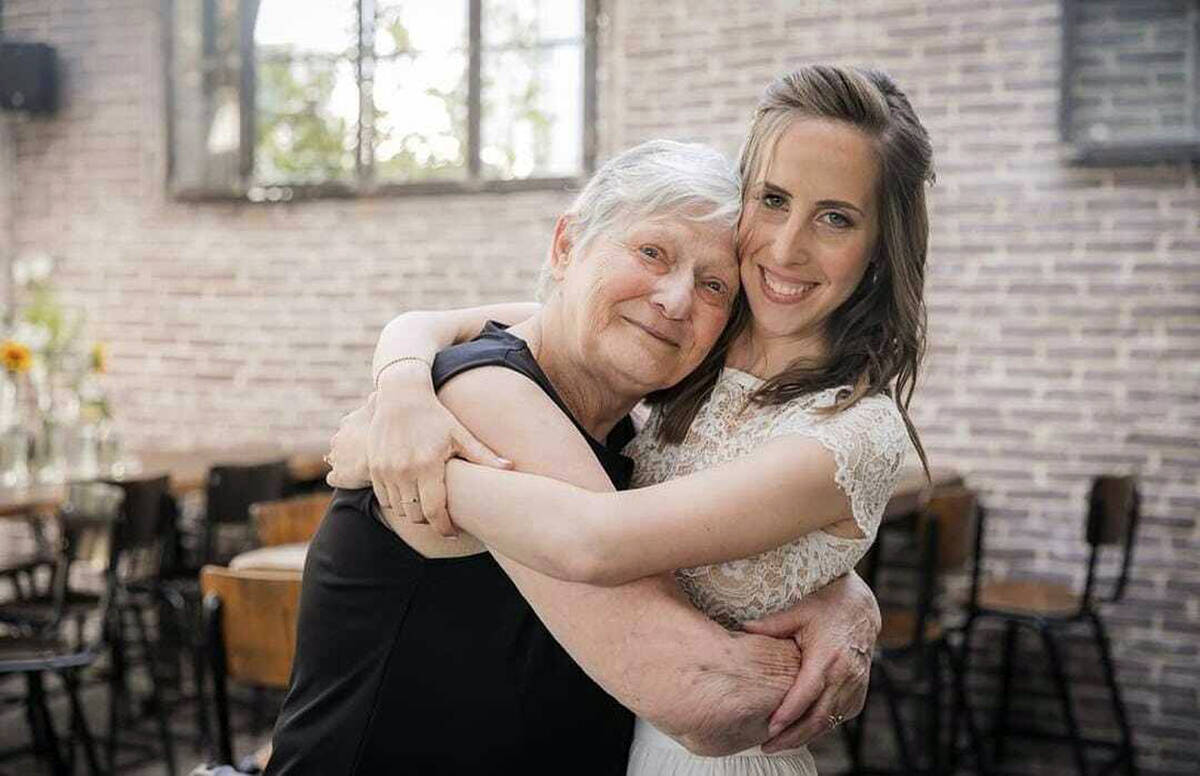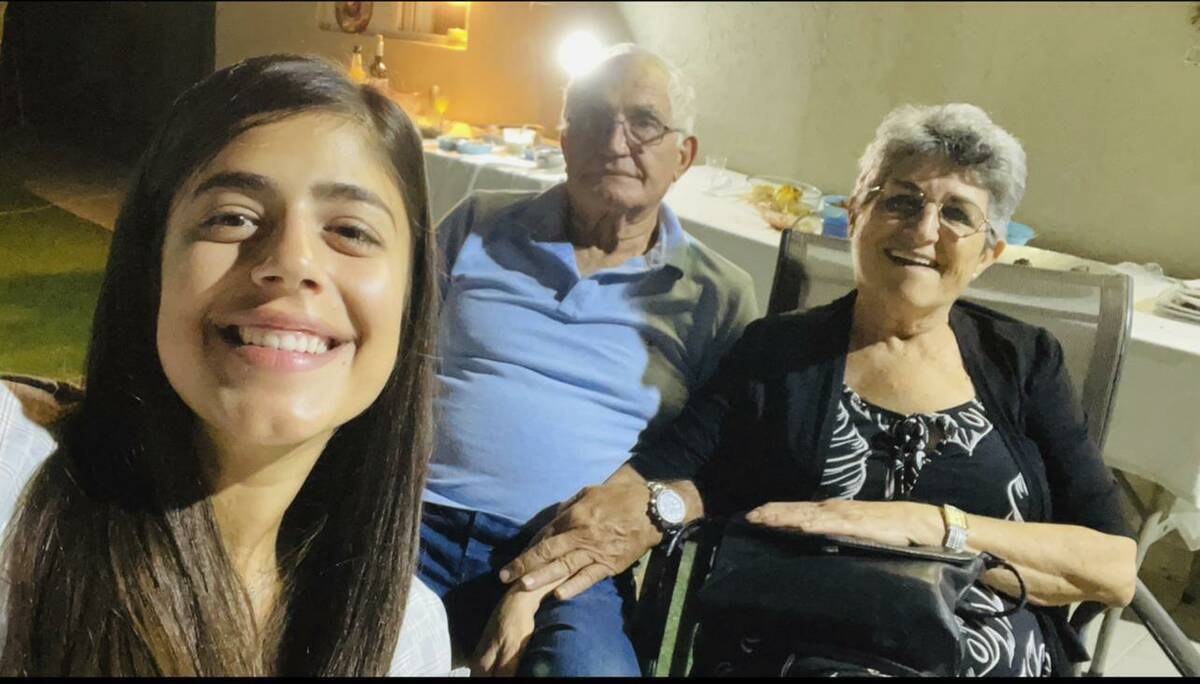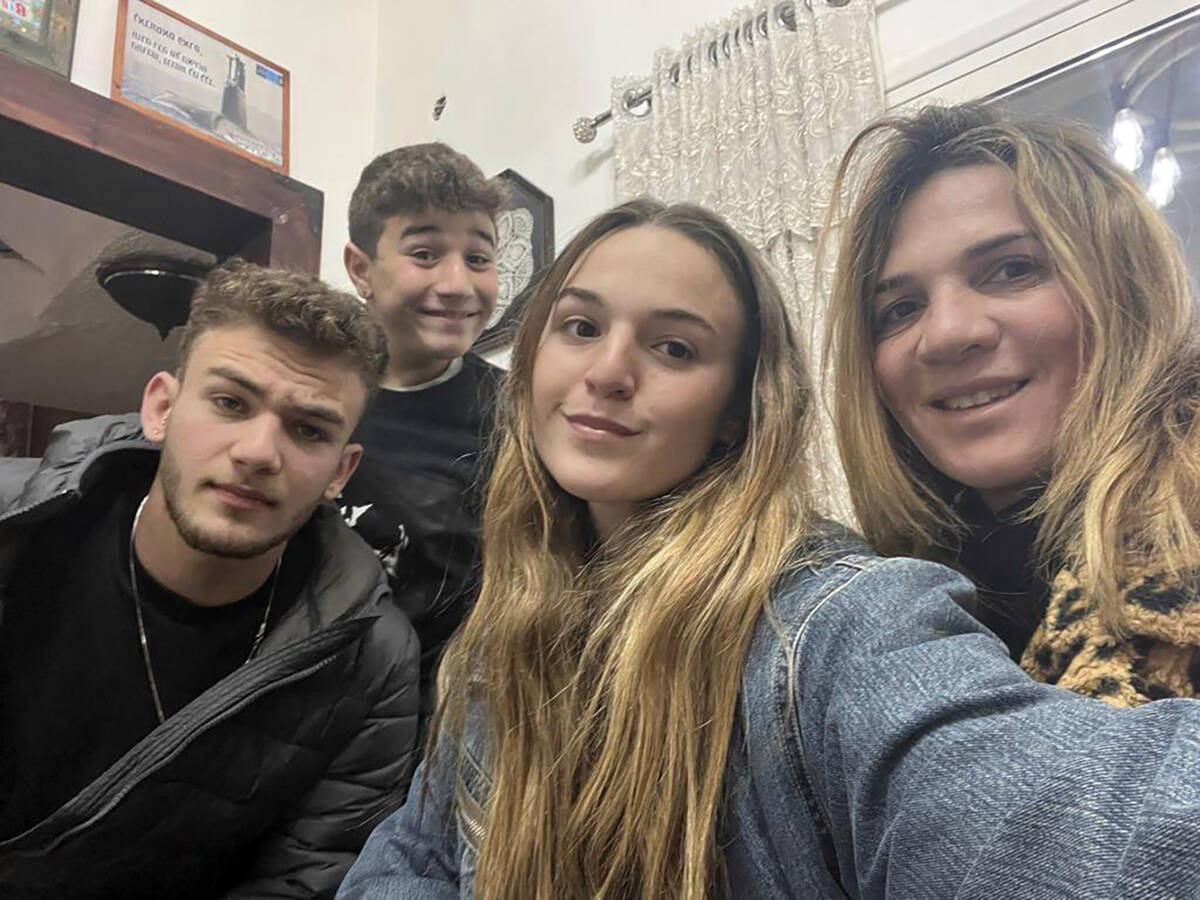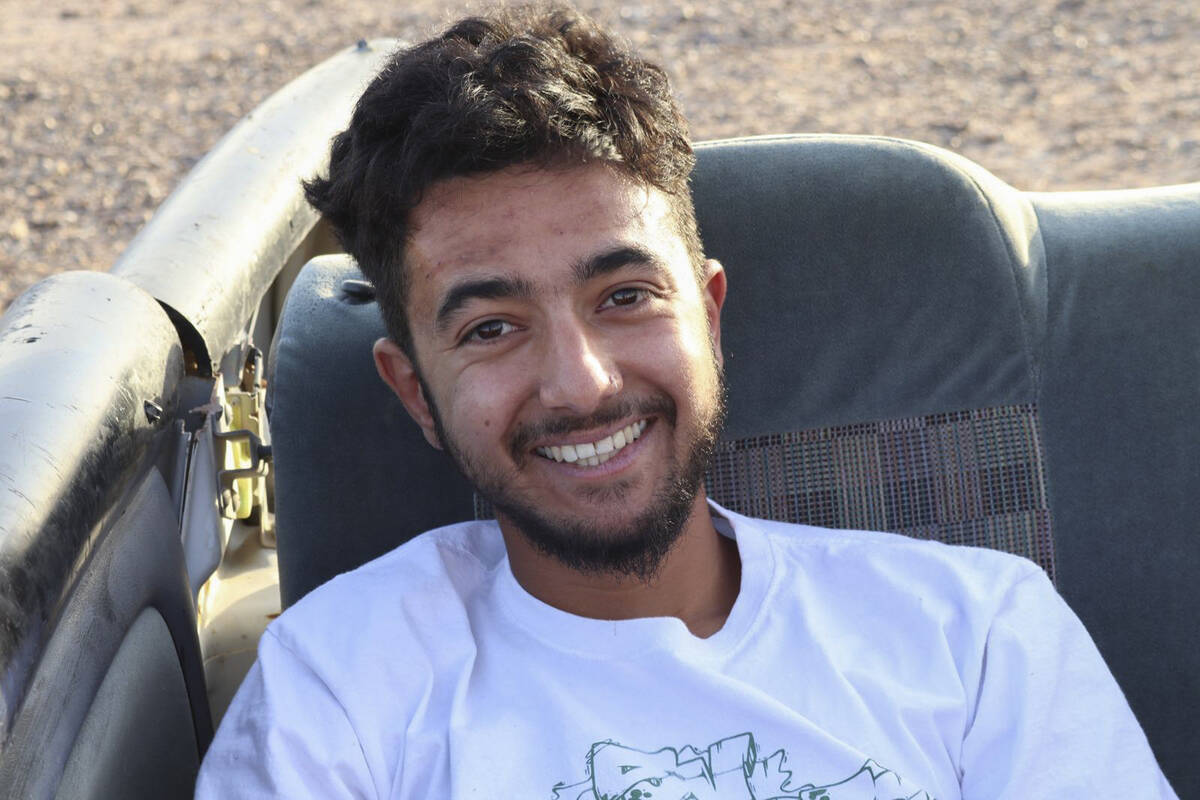Waiting for news, families of Israeli hostages share their stories
They range from babies to the elderly. Most are civilians. Israel says at least 199 people taken during the Hamas attack are being held captive in Gaza.
Some of their families received frantic phone calls or texts during the attack. Others heard nothing and later saw video evidence that their loved ones were taken.
For now, they wait, desperate to find out whether the hostages are even alive. And they tell their stories. Here are some of them.
Sagui Dekel-Chen
Sagui Dekel-Chen is a builder of things. He’s as gifted with his hands as he is at managing community development projects, his father says.
Early on the morning of Oct. 7, Sagui was tinkering with an engine in the machine shop at the kibbutz of Nir Oz, in southern Israel, when he saw intruders on the grounds and sounded the alarm. After running home, he rigged the door of the safe room so it couldn’t be opened from the outside, kissed his pregnant wife and told her to lock herself and their two daughters inside.
Then the 35-year-old father borrowed a gun and tried to protect his community. He hasn’t been seen since. His family believes that the Israeli-American, like several members of the kibbutz, was abducted by the Hamas militants.
“This is a guy who has so much to give,” said his father, Jonathan Dekel-Chen. “He’s already proven it. Ironically not just to Israelis and his family, his children, but to all of our neighbors.”
Sagui Dekel-Chen, who grew up in Bloomfield, Connecticut, is a project manager for the U.K. branch of the Jewish National Fund, organizing the construction of schools and youth centers in the underdeveloped Negev Desert. That included collaboration with both Jewish and Muslim nonprofits that worked in Arab communities near the kibbutz.
“Every day was something different. Every day he was helping other people make their nonprofit goals come alive,” his father said.
The work was an avenue for Sagui Dekel-Chen’s “extraordinary creativity” as he advised non-profits, launched his own projects and built coalitions to get things done, his father said.
“It is a crime that Hamas has made it so that Palestinian people will never be able, I fear, to benefit themselves from my son and people like him because their brains have been poisoned,” he added.
— Danica Kirka
Romi Gonen
Meirav Leshem Gonen says she feel like she has failed to do her job as a mother to protect her 23-year-old daughter, Romi Gonen, who vanished on the day Hamas unleashed its onslaught inside Israel.
Speaking in Cyprus at a support rally for Israel on Tuesday, Gonen fought back tears recount her daughter’s frantic call from an outdoor music festival to describe how a shower of missiles falling around them preceded volleys of automatic gunfire.
“We assumed, OK, a few terrorists, the army will come and everything will be finished in a few minutes, Gonen said. “But the shooting kept on and on, and we are on the phone hearing the shootings, and Romi is terrified.”
Gonen and her eldest daughter spent nearly five hours speaking to Romi, who told them that roads clogged with abandoned cars made escape impossible and that she would instead seek shelter in some bushes to hide from roaming Hamas gunmen.
“She’s afraid and she has to hide from bush to bush so the terrorists will not find her. Just imagine where she was, what she felt,” Gonen said.
Amid the carnage, a ray of hope emerged as a friend who rescued a few other revelers went back in search of Romi and her friends.
But then, the call came that changed everything. “Mommy I was shot, the car was shot, everybody was shot. … I am wounded and bleeding. Mommy, I think I’m going to die,” said Romi.
Trying to lift her daughter’s spirits, Gonen told Romi as if by command that she wasn’t going to die, to stop crying, start breathing and to treat her wounded friends.
“And they knew I was lying because I didn’t have anything, anything I could do to help her,” Gonen said.
“If I cannot help her, I will tell her how much I love her. She’s my kid. I wanted her to remember my words and then told her how much I love her and how much she’s loved, and what we will do when she comes back home. We will go to the coffee shop in Tel Aviv that we’ve been to just a few days ago.”
Romi’s last word on the phone to her mother was “Mommy” as approaching gunfire and the men’s shouts drowned out everything.
Then the phone shut off.
“We are very strong and a very strong mother. But I feel that I didn’t do my job,” Gonen lamented. “And since that day, all I do is make sure that nobody will forget Romi and any others of the kidnapped.”
— Menelaos Hadjicostis
Judih Weinstein and Gad Haggai
Judih Weinstein and her husband, Gad Haggai, were on their morning walk when gunfire erupted and missiles streaked across the sky. Taking cover in a field, they could hear a recorded voice from an alert system for their kibbutz in southern Israel.
“What did she say?” Weinstein, 70, asked in Hebrew as she captured the scene on video.
“Red alert,” her 72-year-old husband said.
Weinstein shared the 40-second video clip in a group chat Oct. 7, when Hamas attacked Kibbutz Nir Oz. That has been their last contact with their family.
More than a week later, Weinstein and Haggai are still missing. Their family used the video to pinpoint the couple’s last known location and shared it with the Israeli army, but a search came up empty. Their fate remains a mystery to their four grown children.
A daughter, Iris Weinstein Haggai, has been relentlessly looking for answers from her home in Singapore. The family heard ominous news from a paramedic, who said Weinstein had called for medical help.
“She said they were shot by terrorists on a motorcycle and that my dad was wounded really bad,” said Weinstein Haggai, 38. “Paramedics tried to send her an ambulance. The ambulance got hit by a rocket.”
The paramedic lost contact with Weinstein, leaving her family grappling with worst-case scenarios.
Haggai is a retired chef and jazz musician. Weinstein, a New York native, is a retired teacher. Both are pacifists who raised their children at the kibbutz, where everybody knows their neighbors.
— Michael Kunzelman
Judith and Natalie Raanan
Judith Raanan and her teenage daughter, Natalie Raanan, were excited to travel to Israel to celebrate a relative’s 85th birthday and the Jewish holiday season, according to their rabbi.
The pair had been sending updates as the trip progressed and were enjoying “this really special mom and daughter time together,” Meir Hecht said.
The family hasn’t heard from either mother or daughter after Hamas launched the unprecedented surprise attack. The community in their suburb north of Chicago fears they are among at least 199 people abducted by Hamas militants, according to Israel.
“We received this terrible news that Judith and her daughter Natalie are missing and apparently were most likely taken as hostages to Gaza,” Hecht said. “It feels like our community has been violated.”
They had been celebrating Simchat Torah, a festive Jewish holiday that marks the conclusion of the annual reading of the Torah. They were in Nahal Oz, a kibbutz in Israel about a mile (1.61 kilometers) from the Gaza border.
Natalie Raanan, 17, recently graduated from high school and was looking forward to taking a break and visiting family overseas, her uncle, Avi Zamir, said at a community event for the Raanans in Evanston on Thursday evening.
“Kind person. She’s a sweetheart. She loves animals,” Zamir said. “We fear for her. We pray for her. We hope she’s together with her mom.”
Through tears, Natalie Raanan’s aunt, Sigal Zamir, said: “I pray for them to come back alive. They’re innocent and loving, and they didn’t do anything.”
Just before she left for Israel, Judith Raanan dropped off a pink prayer book for the Hechts’ 7-year-old daughter, who loves the color, said Yehudis Hecht, the rabbi’s wife and Judith’s friend.
“Judith, we’re thinking of you. Of your resilience, your hope, your love, your generosity, your faith and strength,” Yehudis Hecht said. “We know you’re a strong woman and we pray that we see you safely very soon with your dear Natalie.”
— Melissa Perez Winder and Claire Savage
Yaffa Adar
Yaffa Adar loved reading, writing and keeping connected. Even at 85 she often sent her family messages and GIFs on WhatsApp. She was active on Facebook, her granddaughter recalls.
Keeping in close touch online became especially important in recent years as she found it harder to walk beyond her home in Nir Oz, a kibbutz near the Gaza Strip. Amid that physical struggle, she kept her mind busy and knew what she wanted, her granddaughter said.
“She loved reading,” Adva Adar recalled. “So we were like, “We’re going to get you a Kindle.” What did her grandmother say? “‘No, I like the smell of the paper in books.’”
So when Hamas’ Oct. 7 massacre at Nir Oz ended and no one could find Adar, her family worried. That concern turned to horror when video surfaced showing her being driven in a golf cart in Gaza, wrapped in a pink-flowered blanket.
The footage was among the first evidence that Hamas fighters had not only killed Israelis — more than 1,400, the vast majority civilians — but had dragged dozens back to Gaza regardless of age in the most complex hostage crisis the country has ever faced.
Some people speculated that Yaffa Adar’s unflinching demeanor in the video perhaps meant she didn’t understand what was happening.
Not her family, which includes three children, eight grandchildren and seven great-grandkids.
“She absolutely knew what was going on around her. She wasn’t going to panic,” her granddaughter said.
What’s frightening now is that her grandmother doesn’t have her medication for blood pressure and chronic pain.
“She was really the glue of our family. She loved her life,” Adva Adar recalls. “She liked good food and she liked good wine. She was very young-minded.”
— Laurie Kellman
Roni Eshel
Roni Eshel, a 19-year-old Israel Defense Forces soldier, was stationed at a military base near the Gaza border when Hamas attacked. Although she didn’t answer her phone when her mother called to check on her that morning, she later texted to say that she was busy but OK.
“I love you so much,” Eshel told her mother, Sharon, about three hours after the attack started.
Her parents haven’t heard from her since. More than a week later, Eshel’s family is desperate to know happened to their daughter. Her father, Eyal Eshel, describes the wait for news as “hell.”
“I don’t know what to do. I don’t know what to think, actually. Where is she? What is she eating? If it’s cold for her? If it’s hot? I don’t know nothing,” Eyal Eshel said.
The IDF hasn’t publicly released any names of hostages. Her father says IDF has told them she is considered missing; he believes she has been kidnapped.
“Otherwise, where is she?” he asked.
Eshel grew up in a small village north of Tel Aviv. She reported for military service two weeks after finishing school. She was three months into her second year of mandatory military service.
“It’s part of our life here in Israel,” her father says.
Roni Eshel was in a communications unit at a base near Nahal Oz. She had returned to the base from a brief vacation on the Wednesday before the attack.
Eshel was proud to be a third generation of her family to join the Israeli military. Her father, uncle and grandfather also served.
“She was very happy to serve the country,” her father said.
Her father said she has planned to travel and enroll in a university after completing her two years of service. But he can’t think about her future while she’s missing. Eyal Eshel says he isn’t sleeping, eating or working while he waits.
“I’m not ashamed to ask (for) help. Please help us,” he said.
— Michael Kunzelman
Maya and Itay Regev
“Mom, I’ll unpack my suitcase when I get back,” Maya Regev told her mother that Friday night, in a rush to get going. “See you tomorrow.”
And within a half-hour of returning to Israel from a family trip overseas, 21-year-old Maya and her brother Itay, 18, were on their way to the Tribe of Nova music festival, planning to dance the night away.
It was a typical activity for the duo, who both love to be on the move, gather with friends, and especially to travel, said their parents, Ilan and Mirit Regev. Maya had already bought her ticket for an extended trip to South America in December.
But early the next morning, Ilan Regev’s phone rang. It was a frantic Maya. “Dad, they shot me, they shot me!” she screamed in a recording the family has released. “He is killing us, Dad, he is killing us.”
Her father begged her to send her location, to find a place to hide. “I’m coming,” he said.
Ilan Regev jumped in his car from his home in Herzliya, near Tel Aviv, and sped south to the festival site, where he was barred from entering. Soon, the Regev family discovered a Hamas video that showed Itay in captivity in Gaza.
Maya was not pictured, but the army has told the family both were hostages in Gaza. Officials gave no further information.
“I want to know that my kids are alive,” said Ilan Regev. Added their mother: “We don’t know if they are eating. We don’t know if they are drinking. If they are hurt.”
— Jocelyn Noveck
Hersh Goldberg-Polin
His mother describes Hersh Goldberg-Polin as like a lot of other young people.
The 23-year-old from Jerusalem loves music, wants to see the world and, now that he’s finished his military service, has plans to go to university, his family says. But first he has to come home.
Goldberg-Polin was last seen on Oct. 7, when Hamas militants loaded him into the back of a pickup with other hostages abducted from the music festival where at least 260 people were killed.
Despite those harrowing accounts, his mother, Rachel Goldberg, holds out hope she will see him again.
“He’s a survivor,” Goldberg said of her son, whose grin beams out from behind a sparse, youthful beard in family photos. “He’s not like this big, bulky guy. But I think that survival has a lot to do with where you are mentally.”
Born in Berkeley, California, Goldberg-Polin moved to Israel with his family when he was 7 years old.
As a child, he wanted to learn about the world, poring over maps and atlases to learn the names of capital cities and mountains. Later he became a fan of psychedelic trance music and once took a nine-week trek through six European countries so he could attend a series of raves.
Not surprising then, that he and some friends headed to the Tribe of Nova music festival, billed as a place “where the essence of unity and love combines forces with the best music.”
That vibe was shattered by gunmen who stormed into Israel from the nearby Gaza Strip.
Witnesses said Goldberg-Polin lost part of an arm when the attackers tossed grenades into a temporary shelter where he and others had taken refuge, but he tied a tourniquet around it and walked out before being bundled into the truck.
Family and friends have organized the “Bring Hersh Home” campaign on social media, hoping he will still be able to take a planned backpack trip through southern Asia.
But first his mother hopes someone helps her son.
“It will require like the biggest heroism and strength and courage, but I want someone to help out and I want someone to help all of those hostages.”
— Danica Kirka
Ada Sagi
Ada Sagi was getting ready to travel to London to celebrate her 75th birthday with family when Hamas militants attacked her kibbutz and took her hostage.
The trip was supposed to be a joyous occasion after a year of trauma. Her husband died of cancer last year, she had struggled with allergies and was recovering from hip replacement surgery. But the grandmother of six was getting through it, even though it was hard.
“They had a very, very, very strong bond of 54 years,” her son Noam, a psychotherapist in London, told The Associated Press. “And my mum, this is her main thing now, really, just getting her life back after dealing with the loss of my dad.”
Ada Sagi was born in Tel Aviv in 1948, the daughter of Holocaust survivors from Poland. She moved to a kibbutz at the age of 18 because she was attracted by the ideals of equality and humanity on which the communal settlements were built.
A mother of three, Ada decided to learn Arabic so she could make friends with her neighbors and build a better future for her children. She later taught the language to other Israelis as a way to improve communication with the Palestinians who live near Kibbutz Nir Oz, on the southeastern border of the Gaza Strip.
That was, for many years, her mission, Noam said.
While he hopes his mother’s language skills will help her negotiate with the hostage-takers, he is calling on the international community for assistance.
“The only hope I have now is … for humanity to do something and for me to see my mother again and for my son to see his grandmother again,” he said. “I think we need humanity to actually flex its muscle here, and” — by telling her story — “that is all I’m trying to do.”
— Danica Kirka
Adina Moshe
David Moshe was born in Iraq. So decades later in Israel, his wife, Adina, cooked his favorite Iraqi food, including a traditional dish with dough, meat and rice.
But what really delighted the family, their granddaughter Anat recalls, was Adina’s maqluba — a Middle Eastern meal served in a pot that is flipped upside-down at the table, releasing the steaming goodness inside. Pleasing her husband of more than a half-century, Anat Moshe says, was her grandmother’s real culinary priority.
“They were so in love, you don’t know how in love they were,” the 25-year-old said. Adina Moshe “would make him his favorite food, Iraqi food. Our Shabbat table was always so full.”
It will be wracked with heartbreak now.
On Oct. 7, Hamas fighters shot and killed David Moshe, 75, as he and Adina huddled in their bomb shelter in Nir Oz, a kibbutz about two miles from the Gaza border. The militants burned the couple’s house. The next time Anat Moshe saw her grandmother was in a video, in which Adina Moshe, 72, in a red top, was sandwiched between two insurgents on a motorbike, driving away.
Her grandmother hasn’t been heard from since, Anat Moshe said. She’d had heart surgery last year, and is without her medication.
Still, Anat Moshe brightened when she recalled her family life in Nir Oz. The community was the birthplace and landscape of Adina and David’s romance and family. The two met at the pool, Anat said. Adina worked as a minder of small children, so generations of residents knew her.
But all along, low-level anxiety hummed about the community’s proximity to Gaza.
“There was always like some concern about it, like rumors,” Anat Moshe recalled. “She always told us that when the terrorists come to her house, she will make her coffee and put out some cookies and put out great food.”
— Laurie Kellman
Moran Stela Yanai
Delicate pearls peek out from silver and stainless steel chains — bits of brightness and optimism among Moran Stela Yanai’s jewelry designs that reflected cultures around the world.
Creating art to wear has been Yanai’s joy, but not the only one, her brother-in-law Dan Mor said. Yanai, a 40-year-old Israeli who disappeared after a desert rave, also fiercely protected people and animals.
“Moran is the softest soul,” recalls Dan Mor, whose wife, Lea, is Moran’s sister. “She could almost be annoying with how much she was so kind and sensitive to animals. You couldn’t eat meat because she was so sensitive to animals being harmed — not just pets but farm animals and wild animals.”
Mor has a hard time speaking of Yanai in the past tense. But that’s the least of his family’s unknowns in the wake of her disappearance — and the family’s horror at recognizing her in a video on TikTok that surfaced later. In it, Yanai is sitting on the ground, looking terrified, amid derogatory Arabic text about Jews.
Days earlier, Yanai had posted a video on Instagram on her way to the rave, where she hoped to sell her designs. She posted a second video, recorded by a friend, of her designs displayed on a table at the festival.
“Moran, kind hearted, never caused pain to anyone, not even a fly,” reads the accompanying text. Her work, Mor said, is inspired by cultures around the world, including Chinese and Arab.
Mor, an actor, said his family in Tel Aviv is feeling Moran’s absence deeply and trying to fill the wait by telling the world about her.
“My beautiful dear sister-in-law, auntie to my kids,” he said. “She had a big heart, she has a big heart, and I’m hoping that heart is still pumping.”
— Laurie Kellman



